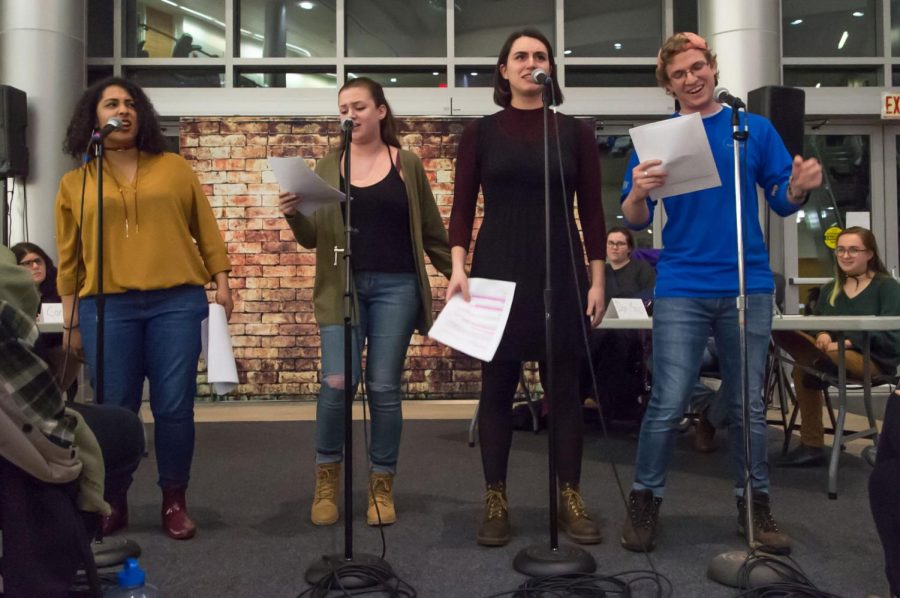RWU poetry slam
Pictures courtesy of Trey Powers
Rebecca Farias
Herald reporter
Spectators packed three floors of Global Heritage Hall as the Roger Williams University community gathered to immerse itself in the spring semester Poetry Slam on Thursday, April 6.
After first competing simply to gain a coveted spot in the Slam itself, the student poets, who refer to themselves as the “Slam Fam,” spent countless hours perfecting their poems and collaborating with each other.
Associate Director of Tutorial Support Services Karen Bilotti, who helped organize the event, commended the dedication of each of these student poets.
“It’s a great spirit of cooperation, and they love working together,” Bilotti said. “I don’t know if you saw all the hugging at the end, but it shows why they call each other the Slam Fam. It’s evidence of that love.”
This work ethic was just one example of the poets’ dedication to their craft: their performances prompted senior Jared Clough, who has hosted the Slam for the past two years and participated throughout his college experience, to reveal to the audience, “The slammers have worked harder than I have ever seen. This is one of the best Slams yet.”
This year, sponsors decided to add an extra twist to the event: the 15 poets competed in four teams, rather than competing alone, as in past years. The Slam has traditionally included two rounds, with the top-scoring poets advancing on to the second round to perform an additional poem.
Like previous years, round one of featured individual performances; however, for the first time, round two featured group poems, written and recited collaboratively.
The teams, named “Cut Above,” “Slam, Slam, Oh Hot Damn,” “The Peanut Gallery,” and “What in Slamnation” hoped to gain scores as close to 40 as possible from the six judges, all of whom were students, faculty, or staff from the RWU community.
The poets quickly captivated their audiences, with their poems often punctuated by laughter, shouts of appreciation, and even tears from spectators.
Poetic themes varied from deeply personal reflections on life to broad social and political critiques, touching on both difficult and uplifting themes.
One of the most popular topics was criticism of the Trump administration, which was echoed in several poems and met with uproarious laughter and shouts from onlookers. Overall, no poet received an individual score lower than an eight.
“We had 16 poets, and all sixteen of the poems we heard were just inspiring, thoughtful, and powerful, top to bottom,” Bilotti said.
During a brief intermission, Karen and various slammers recited a tribute poem to Clough, commemorating his presence at his last Slam.
Clough, visibly moved, read his own poem in return, expressing his gratitude: “Stories are only as real as the people they attempt to understand.”
In the end, team “What in Slamnation” which included Kat Vicente, Emily Dittmar, and Skylar Moncada, came in first place.
“Slam, Slam, Oh Hot Damn,” which featured Olivia Fritz, Emma Ledoux, Grace Napoli, and Nicola Alexander was the runner-up.
For Moncada, an experienced slammer and member of the winning team, the exhilaration of the Slam never fades.
“This is my fourth Slam for Roger Williams, so I am used to the expectations, but you never get used to the 500 people looking down at you,” Moncada said. “It’s very sobering, but I love the feeling. Before I start I always have to take to a moment to breathe and just say, ‘wow.’”
Despite the increased pressure of the group poems, Moncada applauded the new addition to the Slam.
“This is something we debated behind closed doors,” Moncada said. “Do we want to expand or have the same thing over and over for the Slam? I was a big proponent of the group poems. It allowed us to collaborate further. And based on the responses, [the group poems] were super successful.”
While Moncada expressed that he will miss the Slam, he expects to see its effects extend beyond the event itself.
“People had come to me for months after one Slam asking about my poem. They still remembered and appreciated it,” Moncada said. “People are willing to have conversations about very difficult topics and share incredibly personal stories, because we shared a willingness to share them.”
He continued, “I cherish that opportunity, and because the Slam is biannual, it’s that one special part of the semester.”





